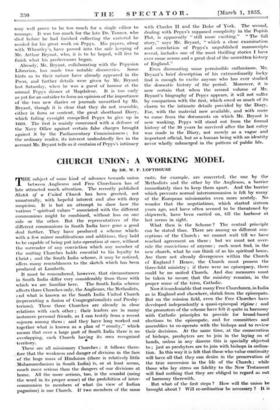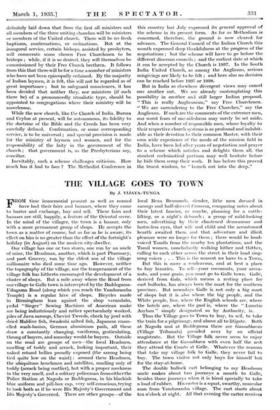CHURCH UNION : A WORKING MODEL
By DR. W. F. LOFTHOUSE
THE subject of some kind of advance towards union between Anglicans and Free Churchmen has of late attracted much attention. The recently published Sketch of a United Church has been greeted, not unnaturally, with hopeful interest and also with deep suspicion. It is but an attempt to show how the various " spiritual values " associated with the different communions might be combined, without loss on one side or the other. But the representatives of the different communions in South India have gone a good deal further. They have produced a scheme which, with a few minor modifications and additions, they hold to be capable of being put into operation at once, without -the surrender of any conviction which any member of the uniting Churches holds essential to his loyalty to Christ ; and the South India .scheme, it may be noticed, offers many resemblances to the sketch which has been produced at Lambeth.
It must be remembered, however, that circumstances in South India differ very considerably from those with which we are familiar here. The South India scheme affects three Churches only, the Anglicans, the Methodists, End what is known as the South India United Church (representing a fusion of Congregationalists and Presby- terians). -These three Churches are already in close relations with each other ; their leaders are in many instances personal friends, as I can testify from a recent sojourn among them ; and they have long worked out together what is known. as a plan of " comity," which means that over a large part of South India there is no -overlapping, each Church having its own recognized • territory.
These are all missionary Churches ; it follows there- fore that the weakness and danger of division in the face of the huge mass of Hinduism -(there is relatively little .Mohammedanism in South India) is, or at least seems, much more serious than the dangers of our divisions at home. All the more serious, too, is the scandal (using .the word in its proper sense) of the prohibition of inter- communion to members of what (in view of Indian paganism) is one Church. If two members of the same caste, for example, are converted, the one by the Methodists and the other by the Anglicans, a barrier immediately rises to keep them apart. And the barrier which prevents normal intercommunion is felt by many of the European missionaries even more acutely. No wonder that the negotiations, which started sixteen years ago, and have often seemed to be threatened by shipwreck, have been carried on, till the harbour at last seems in sight.
What then is the Scheme ? The central principle can be stated thus. There are among us different con- ceptions of the Church ; we cannot wait till we have reached agreement on these ; but we must not over- ride the convictions of anyone ; each must find, in the new church, what he can think of as his spiritual home. Are there not already divergences within the Church of England ? Hence, the Church must possess the three-fold ministry ; if there were no episcopacy, there could be no united Church. And due measures must be taken to secure that the . ministry remains, in the proper sense of the term, Catholic.
Now it is undeniable that many Free Churchmen, in India as in England and elsewhere, shrink from the episcopate. But on the mission field, even the Free Churches have developed independently a quasi-episcopal regime ; and the promoters of the scheme have felt it quite in harmony with Catholic principles to provide for broad-based elections to the episcopate, and for committees and .assemblies to co-operate with the bishops and to review their decisions. At the same time, at the consecration of bishops, presbyters are to join in the laying on of hands, unless in any diocese this is specially objected to ; just as presbyters are to.join with bishops in ordina- tion. In this way it is felt that those who value continuity will have all that they can desire in the preservation of the true succession in the life of the Church ; while those who lay stress on fidelity to the New Testament will find nothing that they are obliged to regard as out of harmony therewith.
But what of the first steps ? How will the union be brought about ? Will re-ordination be necessary ? It is definitely laid down that from the first all ministers and all members of the three uniting churches will be ministers or members of the United church. There will be no fresh baptisms, confirmations, or ordinations. But at the inaugural service, certain bishops, assisted by presbyters, will consecrate some chosen Free Churchmen to be bishops ; while, if it is so desired, they will themselves be commissioned by their Free Church brethren. It follows from this that there will be for a time a number of ministers who have not been episcopally ordained. By the majority of Indian laymen, it is felt, this will not be regarded as of great importance ; but to safeguard consciences, it has been decided that neither they, nor ministers (if such there be) of a pronouncedly ritualistic type, should be appointed to congregations where their ministry will be unwelcome.
While the new church, like the church of India, Burma and Ceylon at present, will be autonomous, its fidelity to the doctrine of the Bible and the Creeds has been very carefully defined. Confirmation, or some corresponding service, is to be universal ; and special provision is made for the ministry of laymen and women, and for the responsibility of the laity in the government of the church ; that government is, as the Presbyterians say, conciliar.
Inevitably, such a scheme challenges criticism. How much has it had to face ? The Methodist Conference in this country last July expressed its general approval of the scheme in its present form. As far as Methodism is concerned, therefore, the ground is now cleared for advance. The General Council of the Indian Church this month expressed deep thankfulness at the progress of the negotiations ; but the scheme will have to go before the different diocesan councils ; and the earliest date at which it can be accepted by the Church is 1937. In the South India United Church, as among the Anglicans, serious misgivings are likely to be felt ; and here also no decision can be reached before 1937 or 1938.
But in India as elsewhere divergent views may cancel one another out. We are already contemplating this possibility in another and still larger Indian proposal. " This is really Anglicanism," say Free, Churchmen. " We are surrendering to the Free Churches," say the Anglicans. If such are the comments of the extremer men, our worst fears of one-sidedness may surely be set aside. And when a number of responsible men, whose loyalty to their respective church systems is as profound and indubit- able as their devotion to their common Master, with their own wide experience of the needs of the mission field in India, have been led after years of negotiation and prayer to a scheme which satisfies and delights them all, the stoutest ecclesiastical partisan may well hesitate before he bids them scrap their work. It has before this proved the truest wisdom, to " launch out into the deep."



























































 Previous page
Previous page